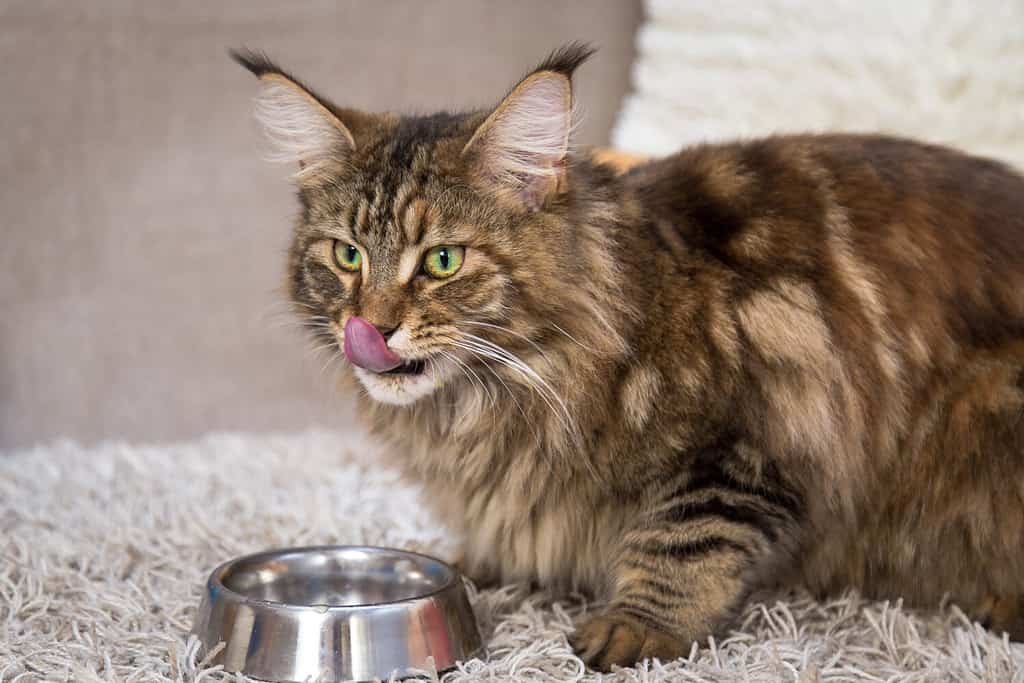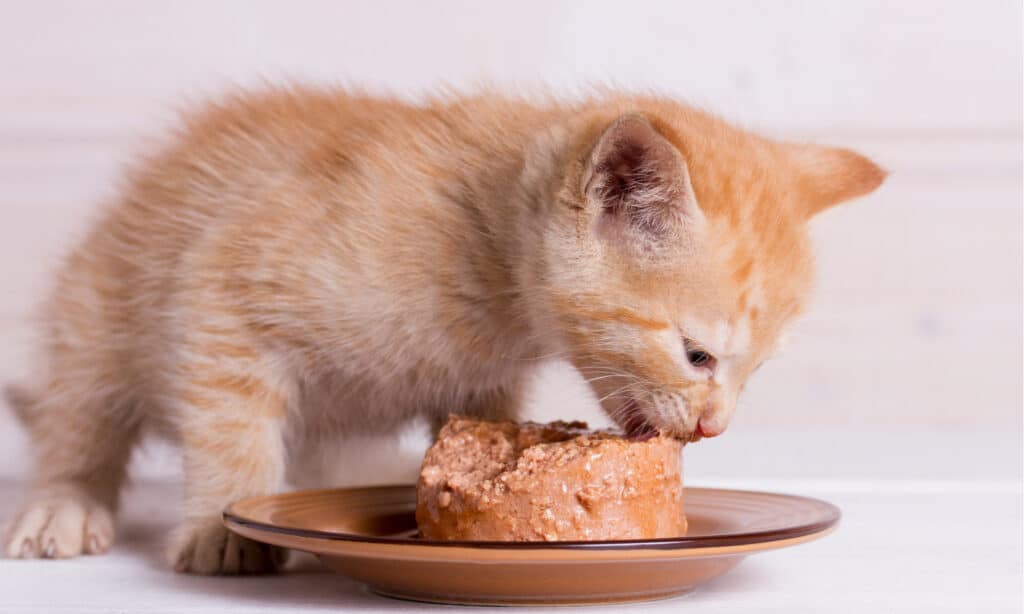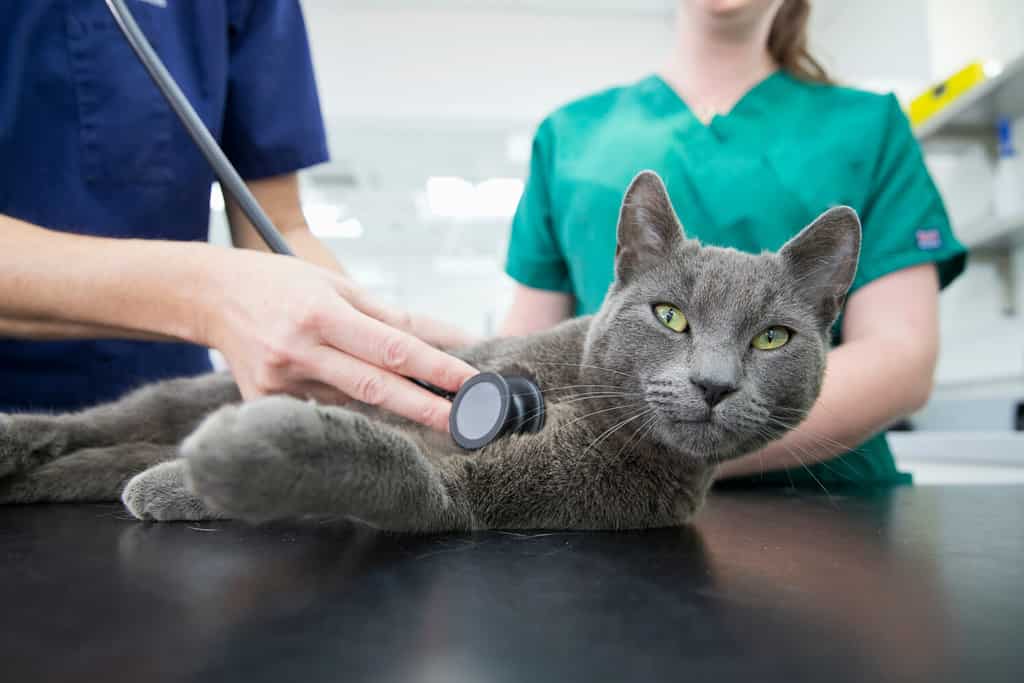We all know that raw meats can be dangerous to humans–but what about felines? Can cats eat raw chicken?
No, cats shouldn’t eat raw chicken. The Federal Department of Agriculture (FDA) and the American Veterinary Medical Association (AVMA) both warn against feeding raw meat to cats due to the potential for bacterial illnesses. Feeding raw meats puts not only your cat but also your human family at risk.
In this article, we’ll discuss six things to know about raw chicken for cats, including why it’s not recommended to feed it, how to best serve chicken to cats, and more.
#1: Can Cats Eat Raw Chicken?

Raw chicken can cause illness in cats and humans who come into contact with contaminated surfaces.
©Phuangphet geissler/Shutterstock.com
Whether or not cats can eat raw chicken is actually pretty controversial! Many people believe a raw diet is best for cats, but most professionals disagree.
Both the American Veterinary Medical Association (AVMA) and the Federal Department of Agriculture (FDA) are against raw diets for pets, as they come with too many risks to animals and humans alike.
Some will argue that raw meat is the most natural food for cats–but cats are domesticated animals, and the diseases that can be caught from raw meat are also natural. That certainly doesn’t make them good for our cats’ health!
#2: Risks to Feeding Raw Chicken to Cats

It’s less risky to feed plain, cooked chicken to your cat.
©Lita Keire/Shutterstock.com
There are four important risks to know about before feeding raw chicken to your cat:
- Parasites and bacteria in raw chicken can infect cats, humans, and other pets.
- Homemade raw diets can lead to nutritional deficiencies.
- It’s difficult to keep surfaces properly disinfected with an animal like a cat since they lick themselves to groom.
- Bones in the chicken can create choking hazards or bowel obstructions.
Raw chicken can contain harmful parasites and bacteria, including Campylobacter, Salmonella, and Clostridium perfringens bacterias. Though cats are less likely than humans to get sick, there is still a risk.
Your human family can also be put at risk, even if you disinfect surfaces after preparing the meat. As the FDA notes, anything your cat licks can also become infected.
Any homemade diet is likely to cause nutritional deficiencies. This isn’t exclusive to raw diets and isn’t a problem if you’re only feeding raw chicken as a treat.
If you do want to feed any kind of homemade diet, it’s vital to have the help of a certified veterinary nutritionist.
#3: Benefits of Feeding Raw Chicken to Cats

Most benefits of raw diets can also be found by feeding your cat canned cat food that contains cooked meats.
©Elizabett/Shutterstock.com
Here are three benefits of feeding cats raw chicken:
- Cats are obligate carnivores, which means they need meat in their diet.
- Chicken as a part of a raw diet can help cats lose weight when compared to kibble.
- Raw chicken can help to keep your cat hydrated.
It’s best to listen to professionals when it comes to your cat’s diet. Luckily, most of the benefits above are also seen in canned wet food for cats–and it doesn’t pose as many risks as raw feeding.
When it comes to raw chicken as a treat, it’s better to instead feed plain, cooked chicken.
#4: Can Cats Eat Chicken Bones?

Chicken bones are also dangerous to cats, whether they’re raw or cooked.
©Mironov Vladimir/Shutterstock.com
Cats should not eat chicken bones. Below, we’ll discuss the downsides to feeding both raw and cooked chicken bones.
Raw Chicken Bones
Raw chicken bones can be choking hazards or create intestinal blockages. They also have all the same risks as raw meat, including illness to your cat or family.
However, they won’t splinter in the way cooked chicken bones do.
Cooked Chicken Bones
Cooked chicken bones are also a no-go, unfortunately. When cooked, chicken bones are more likely to splinter. This can cause tears in the throat or digestive system.
#5: How to Serve Chicken to Cats

Cook chicken thoroughly and serve it fresh to your cat.
©Nitr/Shutterstock.com
Here’s how to cook chicken for your cats so that it is entirely safe for them to eat:
- Skip the seasonings, butter, and other additives! Just plain chicken will be tasty to your cat, and some additives can be dangerous to them.
- Cook the chicken thoroughly until it reaches an internal temperature of 165-175 degrees Fahrenheit.
- Cut the chicken into small pieces and remove all bones before serving.
- Serve only fresh chicken, and always clean and disinfect any surfaces that come into contact with the meat while raw.
- Remember: if the chicken isn’t safe for human consumption (such as if it was left on the counter overnight), it’s also not safe for your cat! Cook and store your meat products properly.
Avoid already-cooked chicken for humans as it often contains other ingredients, such as seasonings, that can be toxic or dangerous to cats.
If you do choose to serve raw chicken, remember to wash and disinfect your food prep surfaces thoroughly. Serve only fresh meat and only what your cat can eat in one sitting. Wash their bowl as soon as they’re finished eating.
Keep in mind the risks, and wash your hands after touching your cat as they may transfer any bacteria from the meat onto their skin and fur while grooming.
Monitor your cat and the rest of the family for symptoms of illness, and see a doctor or veterinarian if needed.
Please avoid homemade cat food, either raw or cooked, unless you have a diet formulated for your cat by a certified veterinary nutritionist.
#6: Symptoms to Watch for After Your Cat Eats Raw Chicken

Many cats won’t become ill after eating raw chicken, but it’s still best to watch for symptoms after they’ve eaten it!
©Juice Flair/Shutterstock.com
The following are common signs of bacterial illness that your cat may experience after eating raw chicken:
- Diarrhea
- Bloody stool
- Mucus in stool
- Fever
- Enteritis
If your cat presents with the symptoms above, please make an appointment with your veterinarian to discuss treatment.
Cats can also be asymptomatic carriers of illness and transfer it to their human family members.
What About Other Raw Meat?
As we discussed above, it’s not recommended to feed any raw meat to your cat due to the risks involved. Instead, try feeding plain, cooked meat without seasoning or other additives.
Avoid processed meats such as sausage, ham, pepperoni, lunch meat, and more. These meats are often too high in fat and salt to be healthy for your cat.
The best meats to feed your cat are plain, cooked scraps of white meats such as chicken or turkey.
Can Cats Eat Cooked Chicken?
Cooked chicken is very healthy for cats, and you’ll often see it as an ingredient in your cat’s food.
When feeding chicken as a treat, be sure to cook it thoroughly, and avoid salt, spices, and other additives. Plain meat is best for cats, especially since many commonly-used seasonings can be toxic. Even salt can cause poisoning to cats in high amounts!
You can even use chicken to entice your cat to eat dinner by using it as a topper for their kibble or canned food. A chicken puree or even unsalted chicken broth also work well for this.
I hope this article has helped you to learn more about raw chicken for cats, why it should be avoided, and some healthier alternatives. Remember that plain, cooked chicken is great for cats and doesn’t come with the same risks as raw meat. Learn more about other things cats can or can’t eat, such as tuna.
Thank you for reading! If you have feedback on this post, please contact the AZ Animals editorial team.
The photo featured at the top of this post is © Phuangphet geissler/Shutterstock.com
Thank you for reading! Have some feedback for us? Contact the AZ Animals editorial team.







